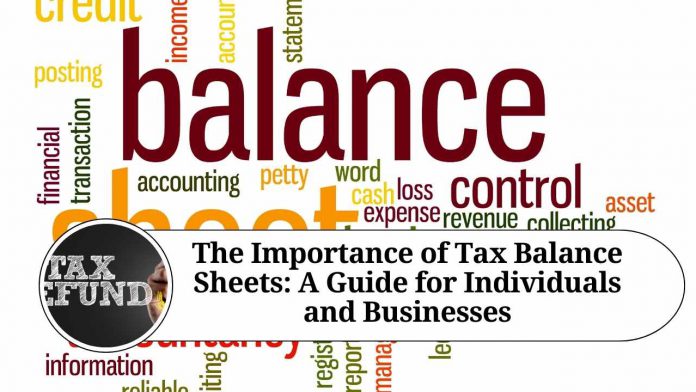There are two types of tax balance sheets: personal and corporate. Personal tax balance sheets are for individuals, and they summarize their tax liability for a particular tax year. Corporate tax balance sheets, on the other hand, are for businesses, and they show the amount of tax owed to the government and any tax benefits or deductions that the company may be eligible for.
Understanding the tax balance sheet is critical for individuals and businesses as it helps to avoid any late payment penalties or interest charges. Additionally, it enables taxpayers to identify any errors in their tax returns, which could result in an overpayment or underpayment of taxes.
The tax balance sheet typically includes the following information:
- Total income for the tax year: This includes all sources of income, such as salary, dividends, interest, and rental income.
- Total deductions: This includes all deductions eligible for tax relief, such as charitable donations, pension contributions, and mortgage interest.
- Taxable income: This is the difference between the total income and total deductions.
- Tax liability: This is the amount of tax owed to the government based on the taxpayer’s taxable income and the relevant tax rates.
- Tax credits and reliefs: These are any tax benefits that the taxpayer may be eligible for, such as tax credits for children or the elderly, or reliefs for business expenses.
- Tax payments: This shows the total amount of tax paid throughout the tax year, including any advance payments, tax credits, or tax deducted at source.
- Tax balance: This is the difference between the tax liability and the total tax payments made.
It is important to note that tax balance sheets can be complicated, especially for businesses with complex financial structures. Therefore, it is always recommended to seek professional advice from a tax expert to ensure that all tax obligations are met and to avoid any penalties or fines.
Final Conclusion
In conclusion, tax balance sheets provide a comprehensive overview of a taxpayer’s tax liability, ensuring that they pay the correct amount of tax owed to the government. It is essential to understand the information included in the tax balance sheet to avoid any mistakes, ensure timely payments, and take advantage of any tax benefits that may be available.
Other Related Blogs: Section 144B Income Tax Act
Q: What is a tax balance sheet?
A: A tax balance sheet is a financial statement that summarizes the tax obligations and payments of an individual or business to a government authority. It provides a snapshot of the taxpayer’s tax liability and the amount of tax paid, and the difference between the two is the tax balance.
Q: Why is a tax balance sheet important?
A: A tax balance sheet is important because it helps taxpayers avoid penalties and interest charges for late payment of taxes. It also allows them to identify errors in their tax returns and to plan for their future tax obligations.
Q: What information is included in a tax balance sheet?
A: A tax balance sheet typically includes the total income for the tax year, total deductions, taxable income, tax liability, tax credits and reliefs, tax payments, and tax balance.
Q: Who needs a tax balance sheet?
A: Anyone who is responsible for paying taxes, including individuals and businesses, can benefit from having a tax balance sheet. Businesses with complex financial structures need to keep track of their tax obligations and payments.
Q: How can I create a tax balance sheet?
A: Creating a tax balance sheet can be complicated, especially for businesses. It is recommended to seek professional advice from a tax expert to ensure that all tax obligations are met and to avoid any penalties or fines.
Q: How often should I review my tax balance sheet?
A: It is recommended to review your tax balance sheet at least once a year, preferably before filing your tax return. This will help ensure that all tax-related information is accurate and up-to-date and that you are prepared for any future tax obligations.




















